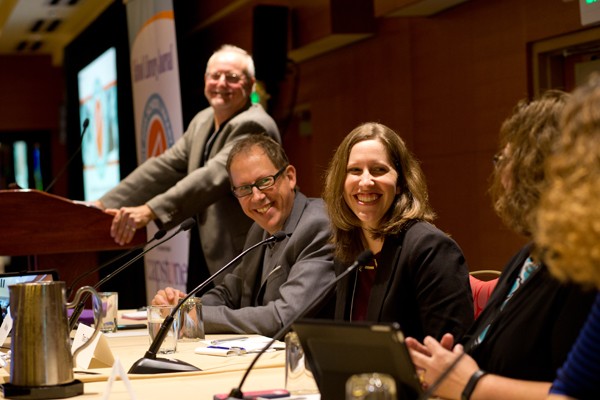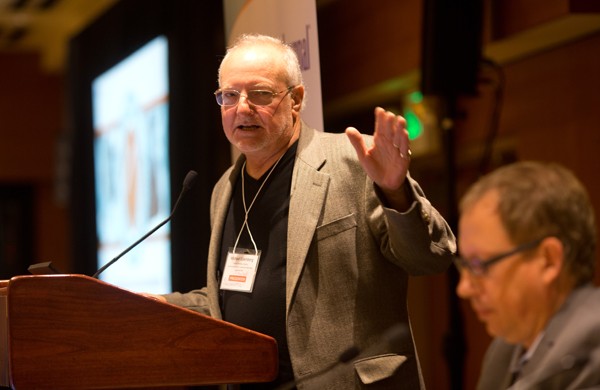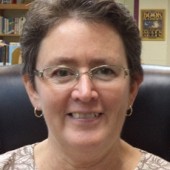Teach More, Librarian Less, Say SLJ Leadership Summit Panelists
How can teacher librarians reimagine their positions to meet strategic student learning needs? That question was the main focus of the SLJ Leadership Summit panel “Become Essential.”

The 2015 SLJ Summit "Becoming Essential" panel participants. Left to right: Mike Eisenberg, Mark Ray, Tara Jones, Colet Bartow, and Jeani Littrell-Kwik. Photos: Karen Ducey Photography
How might teacher librarians reimagine their positions to help meet strategic student learning needs? This was the main focus of the panel discussion “Become Essential” at the SLJ Leadership Summit in Seattle on September 26th. Mike Eisenberg, founding dean of the Information School at the University of Washington, moderated the conversation among four panelists: Colet Bartow, school library specialist, Content Standards and Instructive Division, Montana Office of Public Instruction; Tara Jones, research technology specialist, Bellevue (WA) School District; Jeani Littrell-Kwik, a parent in the Bellevue School District; and Mark Ray, chief digital Officer, Vancouver (WA) Public Schools. Eisenberg opened by saying that he senses a new vibrancy regarding the role of teacher librarians in the Northwest. Where once he felt a need to send out condolences for a field that was dead, there is now a feeling that all things are possible for teacher librarians, he said. Propelling his positive outlook is that in the state of Washington, by law, a school cannot have a library program without a certified professional. “If you don’t have a certified teacher librarian, you don’t have a library,” Eisenberg said. “You have a room with stuff in it.”
Mike Eisenberg, Mark Ray, and Tara Jones.
Bartow agreed, stating that Montana requires, by code, that every school have a teacher librarian. (In contrast, only 10 percent of Oregon schools have teacher librarians.) Much creative thinking and advocacy has brought a “golden age of libraries” to much of the Pacific Northwest, Ray added. Eisenberg predicted that in the future, school libraries will have three teacher librarians, each with distinct roles: reading advocate, information technology literacy specialist, and information manager—the latter also the chief information officer (CIO) of the school. Jones piloted a new role last year—that of research technology specialist. In this job, Jones collaborates with classroom teachers and co-teaches lessons in the classroom. The management of library space is given to a “library specialist,” a paraprofessional who is not certified and mainly circulates materials. Jones is responsible for embedding technology and research skills within problem-based learning experiences. Being in the classroom, she sees what students are missing and then embeds necessary skills into future lessons. The panelists emphasized that work traditionally done in the library can happen outside of the physical space. Ray encouraged the audience to “teach more, librarian less.” When the library is extended into the classroom, he said, the teacher librarian is more visible and may be taken more seriously by the administration. The discussion also focused on a need to move from collaboration toward co-teaching. Jones sits with teachers from every subject area department in her school and plans projects where she’ll be involved from the start to the finish, and she even has input in report card grades. She also offers afterschool tutorials in both research and technology. Students come to her for assistance with any concerns they have in either area. So is Jones’s new position a game changer for teacher librarians? She saw a radical change when she moved to the co-teaching model, and her presence is being requested in more and more classrooms. Being viewed as a teacher also puts her on equal ground with involvement in the planning and implementation of lessons. Not having to worry about the physical library space allows her to develop learning activities that are more meaningful for both students and teachers. On a practical note, Jones uses OneNote to make comments on student work in an online mentoring system. She also teaches students how to organize information digitally—a skill seen as so important for their future. Bartow described how Montana has some similar initiatives. There is a shared library catalog, meaning that cataloging and processing is no longer the primary duty of the teacher librarian. Public librarians are viewed as partners, so more time is freed up for instruction by teacher librarians.
Moderator Mike Eisenberg emphasizes a point.
Ray encouraged attendees to think about which issues are keeping administrators up at night. Determining the strategic needs of the district and working towards solutions within the library are vitally important for the future of school librarians’ jobs, he maintained. Librarians should be seen as progressive thinkers and active leaders in broader ways, he emphasized—and should shift their perception from “L for Librarian” to “L for Leader” in our schools. And along with that, “Embrace digital and don’t look back!” Student empowerment is a key component in allowing teacher librarians to “teach more, librarian less,” the panelists agreed. Jones reminded the audience that students can be trained to help circulate and shelve books, and they can also teach peers and do hardware support. They like to find new programs that can be shared with classmates. Overall, she said, students should drive the learning. In closing, Ray reminded the audience that libraries are essential for literacy—and that everyone in the school should be involved with literacy. “Think globally, act locally,” he said. Ray mentioned the Future Ready pledge that school superintendents across the country are signing and working on. We must clearly articulate what a Future Ready library looks like and move forward towards that goal, he urged. For more information about the school library information and technology (LIT) program at the state level, panelists suggested viewing the State of Washington Office of Superintendent of Public Instructions web page for “School Library Media Programs and Teacher-Librarians,”as well as the Washington Library Association’s “Library Information and Technology Framework.” I’ve created a Storify of my favorited tweets from this panel discussion. Donna Sullivan-Macdonald (@dsmacdonald) is ISTE Librarians Network past president and library media/tech integration specialist at the Orchard School in South Burlington, VT.
Donna Sullivan-Macdonald (@dsmacdonald) is ISTE Librarians Network past president and library media/tech integration specialist at the Orchard School in South Burlington, VT. RELATED
RECOMMENDED
CAREERS
The job outlook in 2030: Librarians will be in demand
CAREERS
The job outlook in 2030: Librarians will be in demand
ALREADY A SUBSCRIBER? LOG IN
We are currently offering this content for free. Sign up now to activate your personal profile, where you can save articles for future viewing






Add Comment :-
Comment Policy:
Comment should not be empty !!!
Lottie
Good Morning, As a teacher librarian in a middle school setting, I would say this article is quite offensive to our practice. The fact that Mr. Eisenberg felt that he needed to send out condolences to the field is disturbing and clearly reflects a lack of understanding of exactly what the LMS role entails This idea that we have to prove our worth and completely change and adapt to show our value is getting out of control. Have we forgotten the basic purpose of a library and the essential need to grow readers? It worries me that others outside of the field think we have to do "other" things to be valued. I can guarantee you that every librarian in the field does more the shelve books. Perhaps we need to go back to actually spending time in the real-world libraries where students love to come browse books, talk about books and get excited for that next great novel that in not yet published. I am a teacher-librarian and very proud to say that I don't have to prove myself to our staff, they value my role and the work I do with students.Posted : Oct 22, 2015 06:15
Jessica
What happens when you strongly, but respectfully, disagree with this? This makes it look like just anyone can "librarian", NOT TRUE. I'm so upset and discouraged at the direction school librarians are going. What we teach is important, yes, but leaving the library to a non certified paraprofessional is NOT the answer. I can do more good as a librarian than as a teacher. This makes me so very sad.Posted : Oct 05, 2015 05:27